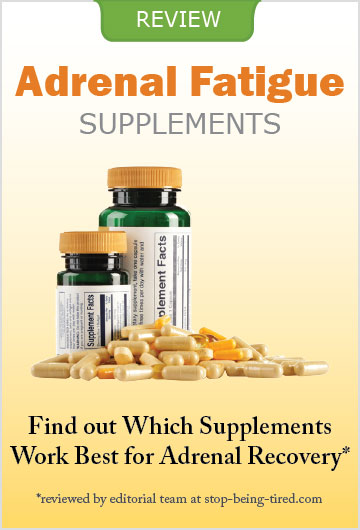What to Do When You Have Elevated Cortisol Levels
Many fatigue patients already understand on some level just how dangerous chronically high cortisol can be. Learn to get your hormones back under control through diet, supplements and lifestyle changes.

When the body is subjected to repeated stressors, the brain’s natural triggering of the stress response can quickly get out of hand. That can lead to a condition where your entire body is so soaked in high levels of cortisol that everything gets thrown out of balance. While cortisol is not a bad thing – it is, after all responsible for aiding in our survival during physically dangerous moments in life – its effects can be harmful when stress-related high levels of the hormone linger for weeks, months, and years.
When Cortisol Goes From Friend to Foe:
Consistently high levels of cortisol can negatively impact health in any of the following ways:
- It can disrupt your sleep-wake cycle
- It increases the body’s resistance to insulin
- It leads to hypoglycemia
- It can kill your sex drive
- It can cause high blood pressure and diabetes
- It can weaken your immunity
- It can make you fat
Fortunately, you can bring those levels back under control through focused effort and a commitment to change.
To be effective, those changes need to be made in areas encompassing various aspects of your lifestyle, exercise habits, and nutrition plans.
Step 1 - Lifestyle Changes
When it comes to lifestyle changes, there are three main things to consider: the amount of rest you get each night, protecting your melatonin levels so that you can sleep properly, and reducing the stress response by managing your stressors. How you accomplish each of these goals will determine your overall success in this area of your recovery plan.
Get More Rest
You might think that you can survive on five hours of sleep a night, but your body would likely disagree. The average person needs seven or eight hours of restful sleep each day. In fact, when you only get six hours of sleep, your cortisol levels can be elevated by as much as fifty percent of their normal levels. If you do that for several days in a row, it can take several more days of normal rest to get those levels back down to where they should be! Aim for eight hours, and try to supplement with naps on those days when you fail to reach that target.
Avoid Melatonin Suppressing Stimuli
As part of your commitment to getting most rest, you need to limit your exposure to anything that might disrupt your melatonin levels. The light from televisions, computer screens, tablets, and similar devices can impact that hormone and disrupt your ability to sleep. Remember, melatonin and cortisol should complement one another within your circadian rhythm. When one is out of balance, normal sleep can become difficult to manage.
Adopt Stress Management Techniques
Mental exercises such as meditation, quiet contemplation, or spiritual endeavors can exert a calming influence that can help rein in raging cortisol. Massages can have that same type of relaxation effect. One other thing that many people fail to consider is the stress-reducing effect of laughter. Share a laugh with friends, watch a funny movie, or spend time with a playful puppy or kitten. All of these things can have a positive impact on your stress levels and your cortisol.
Step 2 - Exercise Regimens
Exercise is important, and can have a dramatic impact on your stress and cortisol levels. Still, it is not enough to just exercise. You must also focus on how you exercise, the amount of exercise you do, and the intensity at which you do it.
Short Resistance Workouts at High Intensity
Resistance training for muscle strength and density is a net positive for people of all ages. However, it is easy to train too much, and when you do your cortisol levels can be negatively impacted. Many young people set themselves up for chronic stress and high cortisol levels by engaging in weight training for hours at a time. Not only is that counterproductive for your stress response, but it also can inhibit the muscle growth they are seeking. It is far safer and more productive to limit training to no more than three or four different exercises a day, comprised of no more than three sets of eight to ten repetitions per exercise.
Regular, but Moderate Cardiovascular Training
Cardiovascular training is another area where people tend to overdo things. After about forty minutes of cardio, the body reaches its peak level of cortisol. Since you want to avoid that wherever possible, it is advisable to limit this activity to a half hour or so. In addition, it is wise to restrict cardiovascular exercise to one short session every other day, to provide time for adequate recovery and minimize the cortisol’s impact.
Step 3 - Nutritional Support
Nutrition can be one of the most overlooked aspects of cortisol control. As a general rule, this important component of stress and cortisol management involves both dietary needs and supplements to provide nutrients that cannot be supplied through diet alone.
Diet
To manage cortisol and stress, it is important that the food you eat be high in quality and low in artificial additives. A whole food diet is a proven way to reduce the damage to your body that pesticides, GMOs, preservatives, dyes, and other artificial ingredients can inflict. Focus on bottled or otherwise purified water, as well as a healthy variety of proteins, fats, and complex carbohydrates. That usually means eating lean meat, and plenty of green vegetables.
Supplements
Since many important nutrients can be difficult to obtain from food sources alone, it is usually necessary to use supplements as well. This is especially true for the B vitamins, and brain-regenerative supplements such as phosphatidylserine. In addition, magnesium is critical if you want to maintain your parasympathetic functions at a normal state. Plus, it’s one of those minerals that your body struggles to retain since it so readily bonds with fluoride and then ends up being deposited in the bones.
When you put all these solutions into place within a comprehensive recovery plan, you can gradually see consistent improvement in your body’s response to stress. Over time, the obvious signs of high cortisol will diminish as your body readjusts and returns to a more natural hormonal state.
You might also be interested in:
- 8 Ways to Beat Your Stress Hormone. http://www.prevention.com/mind-body/how-lower-cortisol-manage-stress
- Reducing the Risks of High Cortisol. http://www.lifeextension.com/Magazine/2011/9/Reducing-the-Risks-of-High-Cortisol/Page-01
- Help! What to Do About High Cortisol Levels. http://healthylivinghowto.com/1/post/2013/02/what-to-do-about-high-cortisol.html
- How to Lower High Cortisol Levels Naturally. http://www.livestrong.com/article/28618-lower-high-cortisol-levels-naturally/
- Cortisol Connection: Tips on Managing Stress and Weight. http://www.unm.edu/~lkravitz/Article%20folder/stresscortisol.html


















Leave a comment